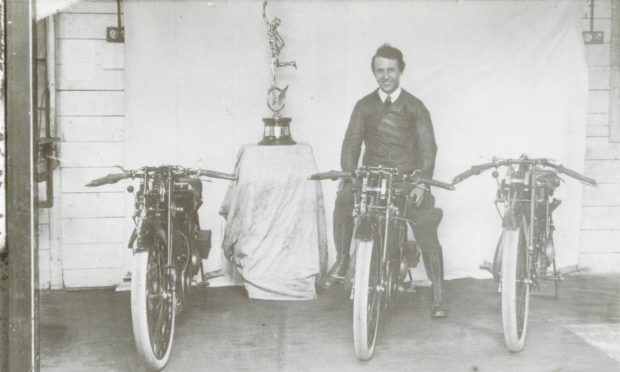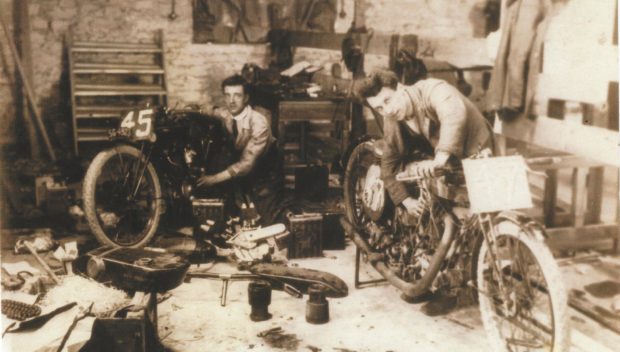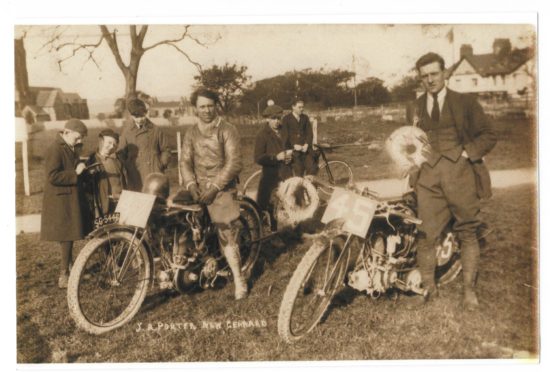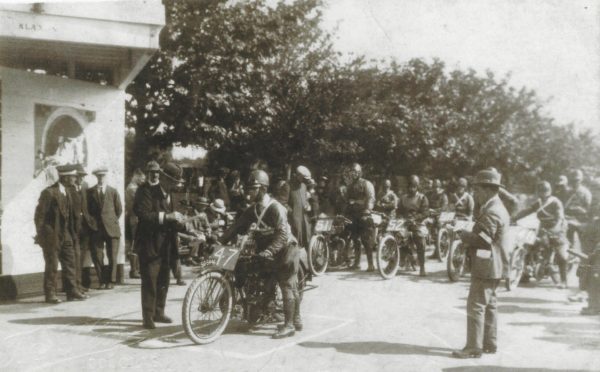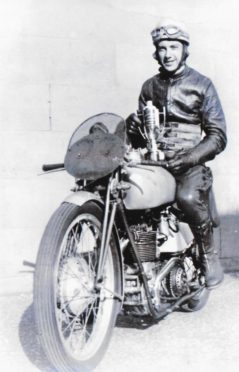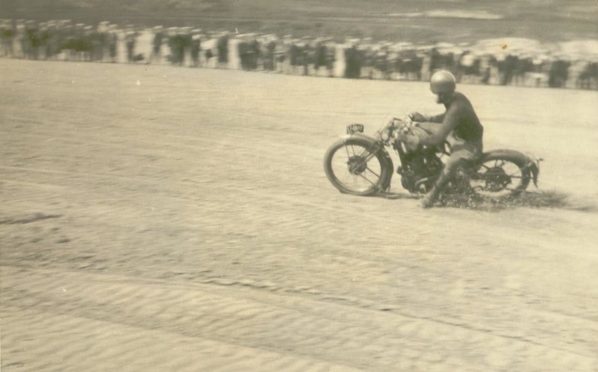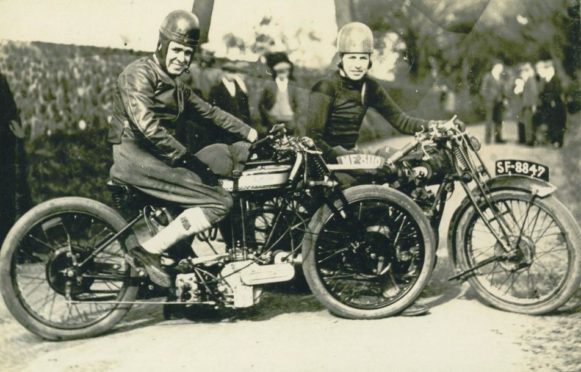Jock Porter was Scotland’s first Isle of Man TT champion who built his own motorcycles.
Jock won “the most dangerous motorsport event in the world” in 1923 and 1924 and won 10 Grand Prix races.
He was hailed as the ‘Solitary Scot’ who travelled to Europe to compete alone but Scotland’s first TT winner remains the nation’s forgotten star.
Hampered by deafness
But his legacy is being kept alive by members of the Kirkcaldy and District Motor Club whose top club riders of the day raced against him in sprints and hill climbs.
KDMC archivist Jake Drummond said Jock’s achievements were all the more remarkable because he was hampered by deafness.
“To be able to travel from Edinburgh to compete in Europe, alone and with no back-up help, and negotiate with the circuit officials and to race his bikes would have been difficult without his lack of hearing,” said Mr Drummond.
“He did at times suffer from injuries incurred during his racing, thankfully nothing serious, but he seemed to put little thought into the prospect of being stranded in Europe, injured and unable to communicate with medical staff.
“Modern riders take for granted financial support from sponsors, with mechanics and the home comforts and ease of travel, but in Jock’s era every trip would be an adventure.
“His determination to succeed against many factory teams shows a character that is much to be admired in these modern times.
“The nation’s first TT winner should be remembered, and any collector with a New Gerrard motorcycle should know the story of the man behind the machine.”
Aberdeenshire parents
Jock was born in Edinburgh in 1894 of Aberdeenshire parents who were from farming stock and traditional gamekeepers on the Duke of Gordon’s estates in the area around Huntly.
He was a keen swimmer and diver in his youth and this caused an infection which led to his deafness.
Jock was originally a Post Office telephone engineer before he put some savings to good use and started ‘Porters Motor Mart’ in rented premises at Greenside Place in Leith by buying ex-Army motorcycles from the First World War and repainting and selling them.
He turned his mind to designing his own motorcycle, which he called the New Gerrard, using Blackburne and Barr and Stroud engines, which he tuned for performance and reliability.
Jock, with brother Jim in the workshop beside him, knew that to succeed they needed to put their faith in the New Gerrard design and he entered the Isle of Man TT in 1922.
The New Gerrard broke down but he entered again in 1923 and won the Lightweight 250cc TT event where only 22 of the 41 competitors finished.
In 1924 he entered the TT again and it was doubtful if he would be able to get to the starting line after he crashed during practice.
He entered in all three of the smaller classes and won the Ultra Lightweight TT in two hours and 12 minutes with a top speed of 52 miles per hour.
Jock added the Ulster Grand Prix in 1924 to the list of wins before he reigned supreme in the 1925 season.
He won the European Grand Prix at Monza and the Belgian Grand Prix at Spa-Francorchamps which was a feat he repeated in 1926 and 1929.
Racing in Scotland
Jock continued to race in Scotland with wins in the 175cc, 250cc and sidecar events at Gifford Hill Climb in 1925; on the sands at St Andrews and Kirkcaldy; and in sprints and hill climbs in Fife and the Lothians, Aberdeenshire and Westmorland.
Jock rode his last TT in 1931.
He died in 1952 aged 58 and is buried in Comely Bank Cemetery in Edinburgh and his gravestone depicts Jock on his New Gerrard motorcycle.
Married to Margaret, the couple had two sons – Jack who became a flight engineer, and Gerard, who took over the business after Jock died.
Gerard was “not really a businessman” and the premises in Edinburgh were sold off to Richards, which was a clothing retail firm.
Jock also had a daughter but sadly they are all long gone.
Colin Campbell
Racing was in the family genes and Jock’s nephew Colin Campbell went on to become Scottish 250cc champion in the era when it was a hotly contested class, even beating his good friend Charlie Bruce, who was the acknowledged rider of his day.
Colin said: “Had Jock Porter been located in the Midlands, rather than in Edinburgh, his racing achievements may have been better recognised, likewise his motorcycle building business.
“I’m glad that at long last his name may be remembered as Scotland’s first motorcycle Grand Prix and TT winner, an achievement worthy of far more recognition than he was credited with while he was alive.”
A history of motorcycle racing in Fife
Fife’s motorcycle competition history began as far back as the 1920’s when local clubs were formed.
The ‘ABC’ catered for West of Fife riders in the Auchterderran, Ballingry and Cardenden area; Burntisland had a small but enthusiastic membership; and inland the Kingskettle club had their meetings on a Tuesday evening.
The Kirkcaldy and Motor District Club was one of the few which welcomed car and motorcycle members, and gradually members of the other local clubs joined when the KDMC began running hill climbs at Dunearn and Auchtertool and sprint events at Donisbristle.
Free show
Even as far back as the late 1920s and 1930s the Kirkcaldy club held championship sand racing on the town beach, with crowds of 20,000 lining the promenade wall for a free show, with the likes of multiple Grand Prix winner Jimmie Guthrie competing against local stars JK Swanston, Tommy McEwan and Jack Blyth.
Championship events were being staged at St Andrews on the West Sands and at Kingsbarns while the East Fife Motor Club held sand races on Leven beach where the firmness of the surface at low tide couldn’t be assured and could cause riders problems.
Grass track racing drew big crowds to various locations; Inverkeithing’s Grasshoppers Club were to the fore during the 1930s with events near Rosyth and Pittenweem had a regular evening grass track just to the east of the town.
Road racing began in Scotland with the 1948 Kirkcaldy Grand Prix which was held at the town’s Beveridge Park, which drew the top high speed racers from across the country and abroad, but probably the best known were Glasgow’s Bob McIntyre and Alistair King, the duo who dominated British racing in the 1950s and 1960s.
The Kirkcaldy Grand Prix became an annual event as ‘The Scottish Road Races for Motorcycles’ until 1988.
The late lamented Steve Hislop raced at ‘The Park’, and Niall Mackenzie had an early outing there before going on great success on the International Grand Prix circuits.
Top names from all over Scotland, and many from south of the border, Ireland and even Australian Bob Brown sampled the ‘delights’ of the town park, some at close quarters in the shrubbery when they got it wrong.
Car racing
There was also car racing in the town park in the early 1950s, with names like Ken Tyrell and Ivor Bueb racing ‘the wrong way round’ in 500cc powered cars, forerunners of Formula Three.
Mr Drummond said: “Karts too raced around the circuit between the trees and past the putting green, with a young David Leslie (later to make it big in British touring cars) doing his best against local Scottish and British kart champion, the late George Bett from nearby Thornton.
“Murray Walker and his father Graham commentated for BBC radio and television on occasion in the early days at Kirkcaldy, though sadly footage from the events was taped over by the Beeb, though every Party Political Broadcast has been retained.
“Our scramble events at Kilrie near Kirkcaldy and Glassliehead above Burntisland were also televised for a few years in the ITV and BBC ‘Grandstand Trophy’ series.
“The series attracted the big names of their day such as Jeff Smith, Badger Goss and Bryan Wade.
“It was broadcast nationally on a Sunday and they were usually wet and muddy events that thrilled millions of viewers!”
KDMC also ran the Scottish Championship events at Knockhill from 1974 to 2010, including the forerunner of the British Superbike Series.
Forays into racing at Crail by the club were beset with land access issues, and over the years only half a dozen events were run there.
Jock’s story is told in volume three of the club’s archives book.
Volumes two to six are now available direct by contacting Mr Drummond on 01592 650562 or 07473174449.
